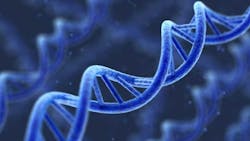US Supreme Court Blocks Patents on Human Genes
WASHINGTON - Naturally occurring human gene sequences cannot be patented but artificially created DNA can be, the U.S. Supreme Court ruled unanimously on Thursday.
The verdict represented a compromise between the goals of the biotech industry, which wanted to preserve all its patents, and campaigners seeking unfettered access to genetic data for researchers and patients.
The nine justices issued the ruling after reviewing a 2012 appeals court decision that allowed biotechnology company Myriad Genetics Inc. to patent two genes it found had links to breast and ovarian cancer, BRCA1 and BRCA2.
Actress Angelina Jolie recently underwent a double mastectomy as a preventative measure after discovering she had a mutation in one such gene and was thus at greater risk of developing breast cancer.
A Product of Nature
"A naturally occurring DNA segment is a product of nature and not patent eligible merely because it has been isolated, but cDNA is patent eligible because it is not naturally occurring," the court ruled.
A coalition of associations representing some 150,000 researchers, doctors and patients, asked the nation's top court to overturn the 2012 decision, as it stopped them from doing further work and research with the patented genes.
Victory for Patients' Rights
So they hailed the ruling as a victory for patients' rights.
"Today, the court struck down a major barrier to patient care and medical innovation," said Sandra Park, senior staff attorney with the American Civil Liberties Union, welcoming the decision.
Myriad offers testing for the two genes, whose discovery in the 1990s was the product of research that typically requires years of effort and large investments.
Myriad "found an important and useful gene, but separating that gene from its surrounding genetic material is not an act of invention," the decision, which was written by Justice Clarence Thomas, said.
Ruling Could Stifle Research
But industry sources expressed concern that the ruling could open the way to further lawsuits that would dissuade firms from pursuing valuable research.
"How long before every defendant challenges every chemical or drug patent as a natural phenomenon?" asked Matthew Siegal, an intellectual property lawyer.
"Atoms exist in nature. For example, iron is the isolation of elemental iron that exists in nature as iron ore."
The Biotechnology Industry Organization offered this perspective: “Today’s decision offers urgently needed certainty for research-driven companies that rely on cDNA patents for investment in innovation,” said Jim Greenwoodt, BIO president and CEO, in a statement.
"In other respects, however, the Supreme Court's decision today represents a troubling departure from decades of judicial and Patent and Trademark Office precedent supporting the patentability of DNA molecules that mimic naturally occurring sequences. In addition, the Court’s decision could unnecessarily create business uncertainty for a broader range of biotechnology inventions.”
In April, during arguments before the court, the justices grappled with hypothetical examples of potential patent bids such as ones for gold from the ground or plants harvested in the Amazon for their medicinal properties.
The court deliberated for only two months, a relatively short time, before unanimously deciding that products of nature are not eligible for patents.
Partial Victory for Myriad Genetics
But the ruling was also seen as a partial victory for Myriad, whose shares jumped on the news, as it was able to retain patents on other gene patterns that fall under the cDNA definition.
"The Supreme Court has ruled, vacating some patent claims and upholding others," Myriad posted on its Facebook page.
"We've always said the debate was about more than patent claims," said Peter Meldrum, president and CEO of Myriad.
"It was about human health and innovation to make sure that cancer tests are accessible and affordable to women who need them."
Researchers have previously been unable to develop tests to compete with Myriad's to determine if a woman is a carrier of the mutations that predispose her to breast or ovarian cancer.
Lisbeth Ceriani, a breast cancer survivor and plaintiff in the case, was faced with having to pay more than $4,000 for Myriad's testing after the firm refused to enter into a contract with her insurance company.
She waited 18 months before she was able to obtain the test through a grant, at which point she learned she did indeed carry a mutation. Jolie's recent mastectomy helped to bring public attention to the prohibitive costs.
"I'm relieved that no other women will have to go through what I went through," said Ceriani. "I'm so glad that the Supreme Court agrees that women deserve full access to vital information from their own bodies."
Nearly 20% of identified human genes are currently under patent, some of which are associated with Alzheimer's disease or other cancers.
These patents are sometimes owned by private companies but also by universities and research institutes concerned with keeping them in the public domain to prevent companies from seizing them.
Copyright Agence France-Presse, 2013 (IndustryWeek added the statement from the Biotechnology Industry Organization.)
About the Author
Agence France-Presse
Copyright Agence France-Presse, 2002-2025. AFP text, photos, graphics and logos shall not be reproduced, published, broadcast, rewritten for broadcast or publication or redistributed directly or indirectly in any medium. AFP shall not be held liable for any delays, inaccuracies, errors or omissions in any AFP content, or for any actions taken in consequence.
